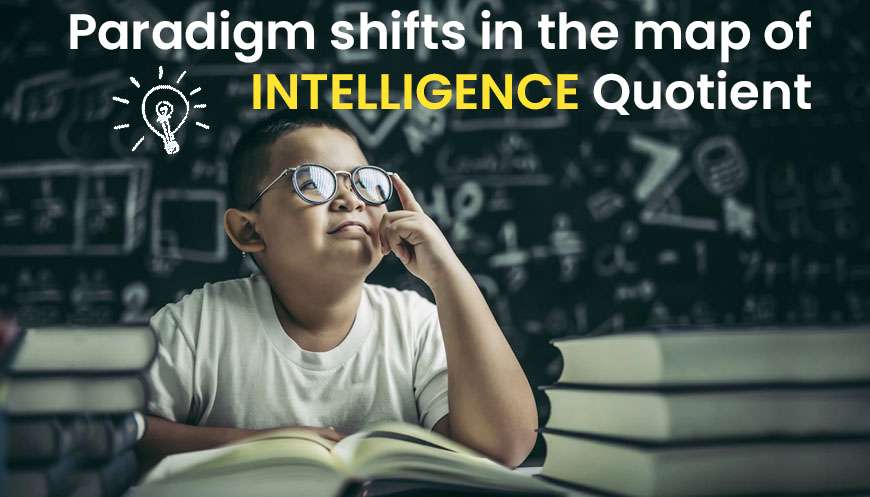BLOG
Paradigm shifts in the map of Intelligence Quotient

By teaching people to tune in to their emotions with intelligence and to expand their circles of caring, we can transform organizations from the inside out and make a positive difference in our world
— Daniel Goleman
In the ever-evolving human psyche and progress, there is constant change in the parameters on which a candidate, whether a student or one considered for employment is evaluated and selected for appointment or academia. In the beginning, all that mattered was IQ and a person was assessed based on his aptitude, intelligence, cognitive abilities, reasoning capacity, and assessing how well an individual can use data and reason to answer queries and make extrapolations. Mensa is a society that credits individuals whose IQ belongs to the top 2% of the populace and has become the yardstick for substantiating one’s brainpower.
Some of the ways to increase IQ are
1. Learn a new language
2. Run to keep the mind agile
3. Catch up on enough sleep.
4. Solve puzzles, both languages, and mathematical.
5. Join a music class/ musical instrument
6. Keep up with current affairs and recent happenings, both national and
International.
7. Learn new courses on diverse subjects.
With the changing times, the priority has shifted from mere IQ as the base for weighing the worth of a student/employee to an EQ-Emotional Quotient perspective.
What is EQ?
According to Dr. Goleman, ‘emotional intelligence is defined as a set of skills or competencies, which provide human resource professionals, managers, and anyone in the world of work, with a comprehensive tool to define, measure and develop emotional skills’.
In the post-pandemic era, where emotion is one of the most searched words on Google, we can confidently say that organizations, academia, and homes that had a better understanding of their emotional state swam through the crisis better than those who were pompous and held anchor to their intelligence.
It is paradoxical that Gen Z which is far more entangled is also the one that is aware and accessible to resources for emotional stability and ease of living life uncluttered.
Some of the ways to increase EQ are
1. Self-Awareness: Becoming aware of one’s strengths, limitations, and triggers that ruin a moment.
2. Self-Regulation: How one is able to cope with and work around the emotional rigmarole and be able to understand the how and why of it.
This may be done by
Pausing before responding: Instant reactions and outbursts are key reasons for spats and fallouts. So, pausing and breathing consciously a few times may better equip one to see the situation more objectively.
Taking a step back and visualizing the situation before addressing it
Recognizing and validating the emotion felt at that moment as real and valid.
3. Empathy: Actively listening to the other person, not just during a crisis but at all times, makes any situation malleable, boosts engagements, builds trust, and helps maneuver through challenges.
4. Motivation Self driven leaders, always prioritize the establishment’s milestones over the material benefits. To achieve this, they involve themselves in the process by setting objectives, assigning responsibilities, and rising up during times of challenges and hardships to help the team stay positive during an enduring environment.
5. Build Social Skills: Beyond looking at profits and gains, one can think more intently about the association, communication, and a shared vision.
Ramayana has a simple story of Lord Rama’s devotee, Shabari, who would bite off every fruit before offering it to him, during his exiled time in the forest. Now, only because Rama was emotionally empowered, was he able to not only accept this gesture but appreciate and acknowledge the intent behind it.
When emotional intelligence merges with spiritual intelligence, human nature is transformed.
— Deepak Chopra
In continuation, there are two more quotients- the Adversity Quotient and the Spirituality Quotient which are considered equally important qualities in young adults and older people.
What is Adversity Quotient:
Wikipedia says, ‘An adversity quotient is a score that measures the ability of a person to deal with adversities in their life. As per W Hidayat, the AQ also has an effect on a student’s mathematics understandability. Hence, it is commonly known as the science of resilience.
The idea of this angle to an individual’s response to his environment. was coined by Dr. Paul Stoltz. He divided people into Quitters, Campers, and Climbers. He proposed four dimensions to measure the Adversity quotient
1. Control: To exercise control when the mind is on a negative rampage.
2. Ownership: Ability to own the problem and find a resolve
3. Reach: The extent to which the difficulties spill over to other phases of life.
4. Endurance: The power to bear the severity of the situation and stay patient for the storm to pass.
This quotient gained great relevance during the Pandemic when every system of work moved to the virtual world and online existence became the norm. While corporates were adapting a lot better to this WFH culture, educational institutions got affected majorly. Students felt displaced, being separated from their friends, delving into the world of Zoom and other platforms, and battling infrastructural handicaps, all adding to depressed youngsters, struggling with coping mechanisms.
A few academic spaces identified this gap and rose to the occasion and provided personal counseling and offered support to ease students out of this displacement.
It is imminent for schools and higher educational institutes to empower their populace with adequate life skills, that teaches them to stay afloat when confronted with a crisis or a roadblock and to have the presence of mind to think well in such moments. New Horizon group of schools and colleges assign enough time and resources to provide the necessary skills in this direction which is appreciable.
The most recent emergent in this line of quotients is the Spirituality Quotient, which is taking the globe by storm. Now, there is a clear distinction between being religious and being spiritual. Religious refers to sects, contained within religions, following specific rituals, dogmas, and ideals. This can impair unity and cause despair amongst people at large. Spiritual intelligence is the aptitude to bring universal synchronization to life, be aware of higher levels of spiritual thought, be mindful of the spiritual magnitudes of everyday occurrences, and practice modesty, gratefulness, and empathy.
How do you practice or acquire this quotient?
1. Volunteer or help others.
2. Practice yoga.
3. Meditate.
4. Keep a journal.
5. Spend time in nature.
6. Focus on your hobbies.
7. Speak to someone you trust.
The spiritual quotient is rising above your rational and sensitive skills. It is acknowledging one’s impermanence and pondering over what one could offer humankind. It is living in self-effacement; bearing in mind that one is just a speck in the vastness of the cosmos. A deep understanding of SQ motivates people to poise their work engagements, spend quality time with their clan, and develop a closeness with the inner self.
As per Maslow’s law of Hierarchy, the last need is Self-Actualization, which is an extension of the recently practiced Spiritual quotient. Only when an individual’s basic needs are met and they are able to move up in the rung of this ladder, can they evolve from being a mere material consumer to an aware human, sensitive to their surroundings and seeing the world with an eye of empowered compassion and simplicity.
Research is on to prove that Intrapersonal Intelligence is the rarest and most difficult to inculcate and exude.
As the saying goes, ‘catch them young, academic spaces and schools in particular may be the right places to groom individuals who are progressing from being only Intelligent, to emotionally sustained, spiritually active, and strong characters, who have the power to endure challenges and emerge triumphant. In this context, New horizon schools, using the Guru-Shishya parampara etch pupils who are provided holistic opportunities for equitable growth and unwavering minds.
To laugh often and much, to win the respect of intelligent people and the affection of children… to leave the world a better place… to know even one life has breathed easier because you have lived. This is to have succeeded. — Ralph Waldo Emerson
These paradigm shifts in IQ redefine intelligence as multi-dimensional, not just academic. Schools also foster personality exploration and reading development to support this. That’s why New Horizon Gurukul is a model for top schools in bangalore and admired as one of the leading cbse schools in bangalore.




